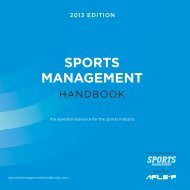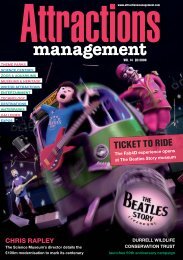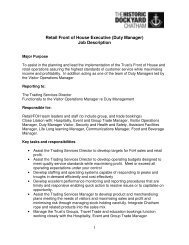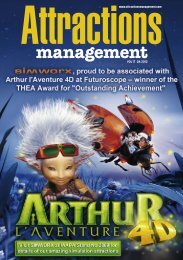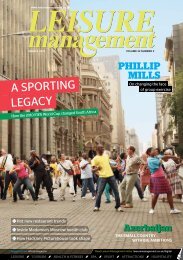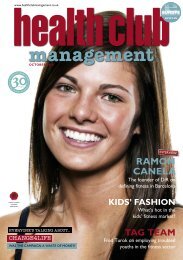Leisure Media Issue 3 2009 - Leisure Opportunities
Leisure Media Issue 3 2009 - Leisure Opportunities
Leisure Media Issue 3 2009 - Leisure Opportunities
- No tags were found...
You also want an ePaper? Increase the reach of your titles
YUMPU automatically turns print PDFs into web optimized ePapers that Google loves.
After graduating from KentUniversity and the LondonInternational Film School, he set upFront Page Films, which he ran until1994, with credits as producer on anumber of features. In 1989, he also became a founder shareholderand chairman of Showcase Cinemas, opening 10 screensacross London, before moving away from the industry into privateequity. It was his desire to get back into the industry heloved that led to the formation of Curzon AE in 2006. “I wantedto combine my film knowledge with my financing knowledge,and I knew you could only enter this industry in one of twoways: from a position of strength, as a market leader, or as aniche player, where you could be more flexible and adaptable.”After an abortive attempt at bidding for the Odeon group(which eventually went to Guy Hands), Knatchbull startedlooking at opportunities within film distribution, and quicklyidentified Artificial Eye – a distributor of art-house and foreignlanguagefilms, with a 350-strong film library – as a leadingplayer in an under-exploited sector. The company also ownedtwo cinemas in London, The Chelsea Cinema and The Renoirin Camden. But knowing that the independent film sector wasfinding it increasingly difficult to access cinemas, Knatchbullcontinued to shop around for other sites too.Founded in Mayfair in 1934, Curzon Cinemas had openedits second site in Soho in 1999. In 2006, its owner RogerWingate signed a deal with Knatchbull to merge the companywith Artificial Eye, as well as a third company, ShowcaseCurzon Artificial Eye has five cinemas,including sites in Soho (picturedabove and on opposite page) andMayfair (opposite page, bottom left).Cinemas (unrelated to the NationalAmusements-run chain of the samename), which owned the RichmondFilmhouse. All five cinemas and thefilm distribution arm were combinedunder a single umbrella: Curzon Artificial Eye, jointly owned byWingate’s Act Entertainment and Knatchbull CommunicationsGroup, a private equity house controlled by Knatchbull.A NEW-STYLE CINEMAUnder the new umbrella, both Curzon Cinemas and Artificial Eyehave remained focused on art-house and foreign-language films.While this market is currently very small and London-centric, it’sunderexploited, says Knatchbull, and he believes there’s an evenwider potential market for less niche independent films.It’s with a view to tapping into this slightly more mainstreammarket, without diluting its existing brands, that Curzon AE haslaunched a second film distribution arm – Chelsea Films – andentered into the deal with HMV. But it was the arrival of newtechnology that actually made the HMV partnership possible, asKnatchbull explains. “With digital technology, we identified earlyon an opportunity to build a new-style cinema using a modular,scaleable approach, which until now wouldn’t have been possible– the idea of building a cinema in a retail store would havebeen unthinkable three years ago.“But with digital cinemas, you don’t need a projection box,you don’t need a box office... you just need a digital projectorand a high-quality sound system and screen and seats. WeISSUE 3 <strong>2009</strong> © cybertrek <strong>2009</strong>Read <strong>Leisure</strong> Management online leisuremanagement.co.uk/digital 31



